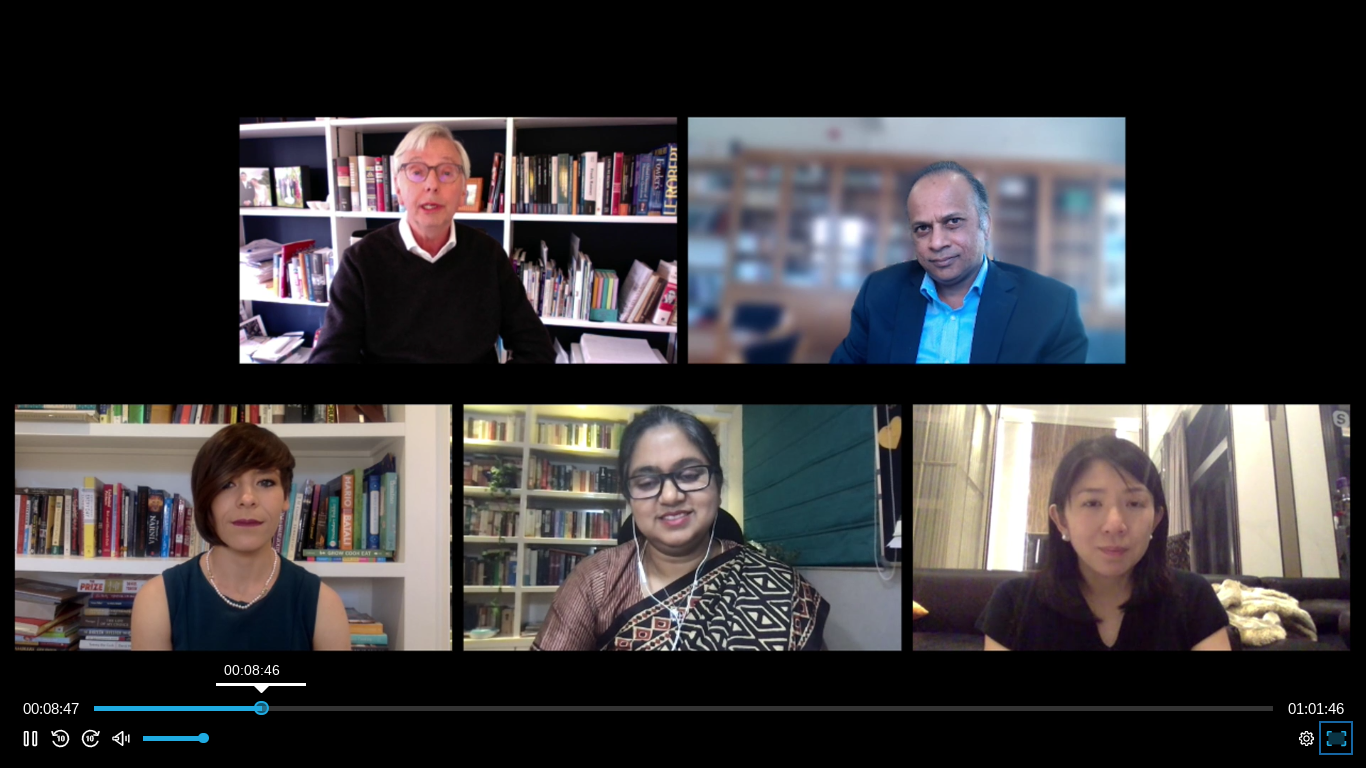
Three Gates Cambridge alumnae spoke at a 20th anniversary event on climate change.
“There is a myth that pitches growth against the environment. Unless we treat the environment right there will be no growth.”
Aditi Mukherji
Three Gates Cambridge alumnae took part in the first of a series of online panels to celebrate the scholarship programme’s 20th anniversary.
The panel discussion, Climate change: the world’s greatest challenge, took place on the day that the Gates Cambridge Class of 2021 was officially announced.
The panel was introduced and hosted by Professor Stephen Toope, Vice-Chancellor of the University of Cambridge, who began by talking to Gates Cambridge Trustee Professor Bhaskar Vira about the scholarship programme’s aims and history.
Speakers on the panel were Victoria Herrmann [2014], President and Managing Director of The Arctic Institute, Aditi Mukherji [2003], Principal Researcher at the International Water Management Institute, and Yeo Bee Yin [2009], former Minister of Energy, Technology, Science, Environment and Climate Change of Malaysia.
Around 1.1K people watched the live event which covered a wide range of issues, including adaptation, mitigation, geoengineering and renewable technologies.
Aditi Mukherji began by saying that we often frame climate change as something that will happen in the future when the impact is already very visible now. She mentioned, for instance, last year’s devastating cyclone in Kolkata – a once in a century event which has been made more likely due to climate change. Combined with Covid, the impact was much worse, she stated. She added that climate change is an ethical and social justice issues since it is often the poorest, particularly farming communities, who are bearing the brunt, for instance, when the limits of adaptation are reached and migration is the only solution.
Victoria Herrmann said adaptation and mitigation strategies are vital since climate change is affecting people’s everyday reality in the Arctic, sometimes with life-threatening consequences. She said: “We need to do everything we can to get to carbon zero yesterday.”
Yeo Bee Yin also spoke about equity issues. She said the voices of the communities who are most affected by climate change are not much heard in climate change negotiations as they lack the resources to lobby at the international table, for instance, for mitigation support and for help to make renewable energy cheaper. She believes technology advances will bring speedier results than negotiations. “The moment we have the technology at the right cost everyone will get into it. Innovation has always played a part in human revolutions and will continue to do so and help us to overcome the climate change crisis we face today,” she said.
Victoria Herrmann added that technological innovation should run alongside traditional knowledge and that innovation should not just be seen in terms of its western definition. Indigenous innovations included land management practices that took into account climate change and platforms for empowering local decision makers and preparing people for what is to come. “Everyone has a part to play in climate solutions,” said Hermann, citing the case of a local leader in west Alaska who piloted a sewage system that adapted to the threats presented by climate change in her own home.
On the politics front, Aditi Mukherji spoke of the need for policies that aim to reduce communities’ vulnerability to climate change and their dependence on fossil fuels as well as those that build capacity and resilience, for instance, policies on how to decarbonise irrigation in a sustainable way that doesn’t make things more difficult for poorer communities.
Yeo Bin Yee said climate change policies were often seen as expensive, with the economy being pitched against green action. However, there was a strong economic case for climate change action in terms of net job creation and reduced energy costs. Reductions in the cost of technology and action by China, the European Union and the US towards carbon neutral targets would increase the market for technology solutions, meaning more countries would be able to raise their targets, she stated.
The panel were asked about geoengineering and agreed that all options should be considered, but that other approaches, such as decoupling GDP growth from carbon emissions should be tried first. Hermann said it should not be an either/or situation between adaptation and mitigation approaches and she called for attention to also be focused on creating equitable solutions for those who are uprooted or whose livelihoods are destroyed by climate change.
Other questions covered population control [Aditi Mukherji said it was better to frame it as a problem of overconsumption rather than population] and the capitalist/consumerist model [Yeo Bin Yee said politicians could educate voters on consumption, but voters need to demand that politicians take action; Victoria Herrmann emphasised the need for sustainable development and degrowth, with systemic change coming from top down and bottom up]. Aditi Mukherji said: “There is a myth that pitches growth against the environment. Unless we treat the environment right there will be no growth.”
Professor Vira said he is “cautiously optimistic” about our ability to tackle climate change. “Climate change is a reality and there is a lot of work to be done, but I am cautiously optimistic when I see the energy of young people such as the [Gates Cambridge] scholars I mentor. They will hold us to account, especially on climate change.”
*Watch the recording of the event above on the University’s YouTube channel.
Next event
The next Gates Cambridge 20th anniversary panel will be held on 18th May and will be on gender equality. Taking part are Melinda Gates, Shadrack Frimpong [2020], Tara Cookson [2011] and Sharmila Parmanand [2016]. Register here.












